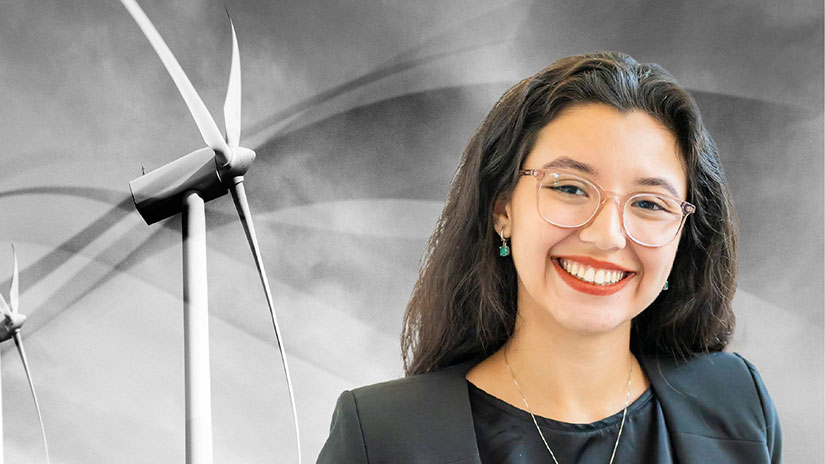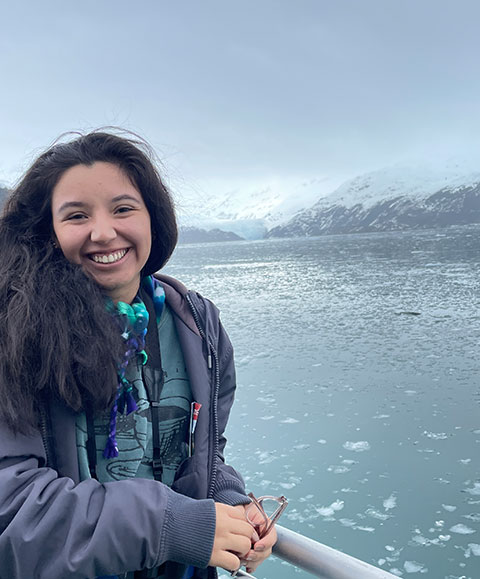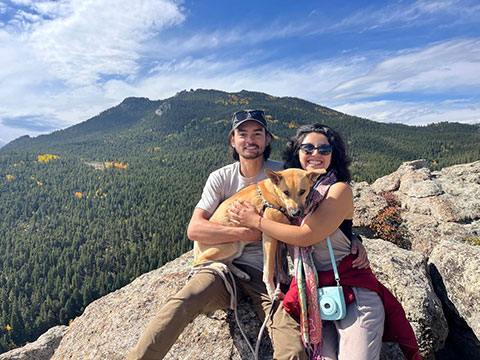Behind the Blades: How Paula Pérez Engineers Equitable Wind Energy Solutions
Wind Energy Analyst and Equity Researcher Combines Technical Expertise With Community-Centered Approaches

Paula Pérez is an engineer by training, but to this National Renewable Energy Laboratory (NREL) researcher, engineering is about people.
“I’ve always felt that engineering is for solving people problems,” said Pérez, who studies wind energy equity and techno-economic analysis. “I think our work should center the people who will be impacted by it.”
With an early passion for math, physics, and engineering, Pérez first started using her technical skills to address social challenges in her home country of Colombia, where she worked with Indigenous communities facing water scarcity. Later, she helped design and secure funding for a solar microgrid that powered 200 households in rural Argentina and helped power underground water pumps to increase water access. She has also worked on water-related issues in Alaska and Haiti.
Pérez began college at Florida International University in Miami and transferred to the University of Colorado Boulder, where she completed a bachelor of science degree in mechanical engineering and a master of science degree in global engineering. Her experiences in Latin America, the Caribbean, and the United States have influenced her both personally and professionally.
“I grew up in a comfortable home and wanted to find ways to help others who weren’t as fortunate,” Pérez said. “I saw an opportunity to use my technical skills to serve communities, but I had to learn how to listen to the people in the communities I was trying to help and develop solutions that truly met their needs.”
Read on to learn how Pérez continues to apply her technical knowledge and focus on equity in her current role at NREL.
Tell me about your work. What do your days look like? What problems do you try to solve?

I often say I wear two hats. When I started a little over a year ago in summer 2023, I was primarily hired as an equity researcher, but I also do techno-economic analysis.
Putting on the techno-economic analysis hat first, I dive into data and do a lot of coding to understand how much land-based, distributed, and offshore wind energy we can deploy. This involves identifying barriers, understanding supply chain constraints, and exploring ways to encourage more manufacturing and deployment.
Switching to my equity researcher hat, I take those technical findings and look at their broader impact: How does wind energy development affect communities? What does wind energy development mean for rural communities, Tribal nations, and people of color? My goal is to ensure that everyone gets to benefit from the energy transition and that no one population has to shoulder the negative impacts.
Overall, my work tries to answer questions like, how can we deploy wind energy faster? How can we do it more fairly? And how can we improve the process overall?
Wind energy equity and techno-economic analysis seem like two distinct but related disciplines. How did you come to occupy these two particular niches of research?
Throughout undergrad and grad school, I gravitated toward a middle ground between hard science and social science. We need to combine these methods, which are often considered separate but must be integrated. We should consider energy justice as part of all our technical work.
I've worked in water access, water security, STEM education, and decentralized energy for rural and Tribal communities. I was a National GEM Consortium fellow at Oak Ridge National Laboratory in 2022, which is how I decided I wanted to continue working in the national lab system and eventually found myself at NREL.
What are you working on right now that you’re especially excited about?
In a great example of wearing both my energy equity and techno-economic hats, I’m working on the SMART-POWER Workforce and Supply Chain Analysis. This is a partnership between NREL and the states of Maryland, Virginia, and North Carolina, with participation from the state of Delaware. My team at NREL is helping government agencies in these states understand the opportunities and challenges of building up their offshore wind supply chains. There are also important considerations around energy justice, workforce development, and the implications for developers, manufacturers, and other stakeholders. It's an attempt to address energy justice at a more localized level than we have in previous supply chain work.
I'm also working on data to help us better understand the potential of distributed wind energy, which is getting a lot of attention from DOE and external partners right now. We’re creating new tools for improved modeling and a robust strategy for providing distributed wind technical assistance to interested communities.
Let's say we talk again a year from now. What do you hope to be celebrating then?

In a year, I'll have a couple of publications out in the world. It will be exciting to see that work materialize into something public. I’ll also be intrigued to see what comes of our work with distributed wind energy over the next year.
On the personal side, this coming January will be the one-year anniversary of my becoming a dog mom. Earlier this year, my boyfriend and I adopted a German shepherd mix named Koda. We first met him when he was three months old, when my boyfriend’s neighbors were fostering him. We tried to resist, but eventually we caved and adopted him. He’s the best.
Who are you outside of NREL, in addition to being a dog mom?
I'm newer to Colorado and have been here for about three years. I try to do all the Colorado things, like skiing and hiking, but at a slower pace. I enjoy going salsa dancing with my boyfriend and friends—there's a great spot in Denver called La Rumba. I try to visit home when I can. My family is very encouraging of my career and studies, but they're all still in Colombia, so I try to stay close with them.
I'm also a big bookworm and love science fiction. Working in renewable energy technology is cool because I can geek out about the things science fiction writers dream up. I'm a huge fan of the Dune books and love the movies that are coming out. I also enjoy magical realism. I read La Casa de los Espíritus, or "The House of the Spirits," by Isabel Allende last year, and it's one of my favorites. Magical realism books are often written by Latin American authors, so I like to read them in Spanish to feel a bit more at home.
Learn more about NREL’s wind energy research, offshore wind energy in particular, and the amazing people behind the blades by subscribing to the Leading Edge newsletter.

